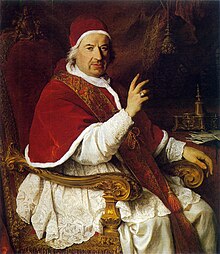Vix pervenit
Vix pervenit is an encyclical, promulgated by Pope Benedict XIV on November 1, 1745, which condemned the practice of charging interest on loans as usury.
[1][2] The encyclical codified church teachings which date back to early ecumenical councils, at a time when scholastic philosophy (which did not regard money as a productive input) was increasingly coming into conflict with capitalism.
[1] Theological historian John Noonan argues that "the doctrine [of usury] was enunciated by popes, expressed by three ecumenical councils, proclaimed by bishops, and taught unanimously by theologians".
It certainly should not be considered as usurious; (...)[6]As is usual practice with encyclicals, the text derived its title from the Latin opening words, which translate into English as "It has hardly reached [...]".
[9] Months after the publication of Vix pervenit, Maffei published a second, almost identical edition of his treatise-which contained the full text of the encyclical and a dedication to Benedict XIV, his friend-with the imprimatur of the Catholic Church.
[10][11] Papal historian John Pollard argues that the encyclical's prohibition on usury contributed to the dependence of the Holy See upon Jewish bankers like James de Rothschild.
[10][better source needed] According to the Catholic Encyclopedia, circa 1912, "The Holy See admits practically the lawfulness of interest on loans, even for ecclesiastical property, though it has not promulgated any doctrinal decree on the subject".
[18] Writing for This Rock magazine, David Palm argued with a more holistic approach, taking into account Mosaic Law,[19] the teaching of Jesus,[20] the above-mentioned Fifth Lateran Council, development of economic sciences and especially the development of the practical economy since the Industrial Revolution, that the old economic mentality, expressed in Vix Pervenit, simply fails to capture the entire complexity of the modern world.
